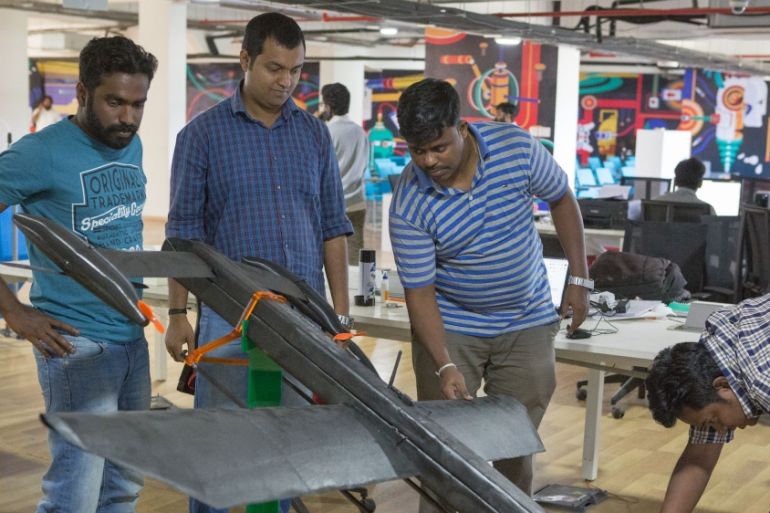Staying home: Kerala keeping talent local to grow its economy
The Indian state has long depended on remittances from abroad, but now homegrown tech firms are creating new jobs.

Kochi, India – Rajeev Chandrasekharan’s drone business is ready for take-off. In his sparse, and as yet incomplete, office in the southern Indian state of Kerala, he says he’s grateful for the local government’s initiative to help startups like his.
“Kerala’s startup ecosystem is promising,” he told Al Jazeera from his company’s headquarters in the Integrated Startup Complex. Elsewhere on the site, others are making social media videos and creating software for the hotel industry.
Keep reading
list of 4 itemsHong Kong’s first monkey virus case – what do we know about the B virus?
Why will low birthrate in Europe trigger ‘Staggering social change’?
The Max Planck Society must end its unconditional support for Israel
The sprawling facility on the outskirts of the state’s commercial capital Kochi is a local government-funded innovation incubator that was inaugurated in January. It’s expected to begin full operations in the coming weeks. Once under way, it’s slated to be one of the largest startup hubs in India, with 150 companies due to begin operations this year alone.
Not everyone agrees that the state government’s approach to luring tech talent is the right one, or that it’s making a significant dent in its troublingly high unemployment rate.
But such issues don’t seem to be much of a bother for Chandrasekharan. He’s the CEO of FeatherDyn, a firm he and two other former aerospace engineers set up in Kerala last year. He says a large global shipping company has already shown an interest in its unmanned drones that are designed to lift heavy equipment used to check cargo ships and oil and gas pipelines.
He’s part of a new generation of Keralites who are looking to stay in India to build their careers, rather than follow in the footsteps of previous generations who went abroad, mostly to the Middle East, to find work.
Homeward bound
Between 2013 and 2018, the number of Keralites living overseas fell by around 300,000 to 2.1 million people, according to a survey completed last year by the Centre for Development Studies, a research institute, and commissioned by the Kerala state government. The report says 89 percent of Kerala’s emigrants live in Middle Eastern countries in the Gulf.
The largest proportion of those who returned, slightly fewer than a third, did so because they had lost their jobs, either due to programmes in host countries to increase the number of their citizens in the workplace, or companies feeling the pinch of a steep drop in oil prices since 2014.
Kerala relies heavily on foreign remittances. According to Irudaya Rajan, one of the authors of the report, payments sent home from abroad make up a third of the state’s income, one of the highest such ratios for any region in the world.
But Kerala is something of an anomaly in India. Nationwide, the number of Indians moving overseas appears to be growing, according to the United Nations. But the reversal in Kerala’s migration patterns has forced the state’s government to make an aggressive push to create jobs.
The Integrated Startup Complex is a key part of that plan.

Spread over the equivalent of three American football fields, the complex includes offices, labs, conference rooms and manufacturing facilities.
But the Kerala government also offers startups a loan programme and helps emerging tech firms raise funds by linking them up with venture capitalists and other investors. It also runs mini incubators in 200 colleges across the state to encourage students to enter the technology industry.
Chandrasekharan said he tried looking for similar opportunities in Bengaluru, India’s technology capital in the neighbouring state of Karnataka, but “could not find a place like this”.
Kerala became the first state in India to formulate a comprehensive startup policy in 2014. It aimed to attract investments of $720m, hire international mentors, and send Keralites abroad to learn from more advanced startup markets.
Flawed strategy?
By at least one measure the strategy seems to be working: the number of technology startups in Kerala has tripled to 750 over the last five years, and local authorities expect Kerala to become the number one destination for startups in India by 2020.
“We cannot rely on the financial health of other countries,” Saji Gopinath, CEO of the Kerala Startup Mission, told Al Jazeera. The body is a state government agency set up to promote entrepreneurship.
But critics of Kerala’s plans say the government’s strategy for attracting tech entrepreneurs is flawed and has yet to create enough jobs.
“I would not say that it has contributed much to Kerala’s economy. We should ask ourselves, what are the results of the Startup Policy?” Rony Thomas Rajan, assistant professor at the Department of Economics of the University of Kerala, told Al Jazeera.
According to a major economic review published by the Kerala state government in February, its unemployment rate of 12.5 percent between 2015-16 was one of the highest in the country, and more than double the national average of five percent over that period.
And unemployment was a major concern for voters across India during last month’s national elections. In a national survey published in March by the Azim Premji University in Bengaluru, 19 percent of respondents said it was the single biggest problem the country faces.
Government figures released last Friday showed the country’s unemployment rate rose to a multi-year high of 6.1 percent in the 2017-18 fiscal year.

Critics of Kerala’s startup policy say it relies far too heavily on government support. They point to the thriving technology hubs in Bengaluru, Mumbai and the capital New Delhi which have attracted much higher levels of private investment.
“We have very few private investors,” Kerala Startup Mission’s CEO Gopinath admitted.
‘There’s a lot happening here’
But for Kerala’s budding entrepreneurs, the Integrated Startup Complex is something of a godsend.
Nisha Krishnan recently took up space within the complex to operate a digital video platform, I’m Channel, aimed at promoting entrepreneurship.
“There is a lot happening here; it needs to be reported,” she told Al Jazeera. Her company has already produced 900 videos on startups, innovation and technology, both in English and the local Malayalam language.
Krishnan says Kerala’s entrepreneurs are no longer copying concepts from Silicon Valley, but are charting their own course to address issues faced by their local communities.
Another startup on the site is Instio, which creates software for the local hospitality industry. Its founder, Girish Prabhu, used his own money to launch the company in 2016. He moved to the complex earlier this year and is now planning to use it as a launchpad to expand to Dubai.
He’s taking advantage of opportunities in the Middle East, but in a very different way to how his forebears might have done.